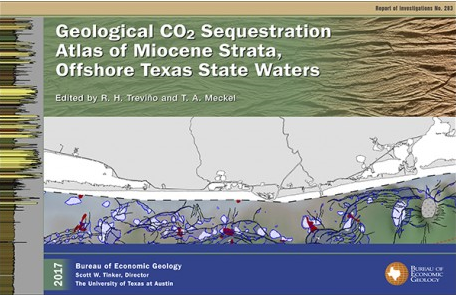News 2016
December 8, 2016: Congratulations to Luca Trevisan for the publication of two new papers. With co-authors Tip Meckel and P.G. Krishnamurthy, he published "Impact of 3D capillary heterogeneity and bedform architecture at the sub-meter scale on CO2 saturation for buoyant flow in clastic aquifers" in the International Journal of Greenhouse Gas Control. He has also published "Enhancing capillary trapping effectiveness through proper time scheduling of injection of supercritical CO2 in heterogeneous formations" in the journal Greenhouse Gases. His co-authors on the paper are Ana González-Nicolás, Tissa H. Illangasekare, Abdullah Cihan, and Jens T. Birkholzer.
December 7-9, 2016: Susan Hovorka assisted USEA and DOE HQ to host a group of executives from Yanchang Petroleum Company, Shaanxi province, China on a study tour of the Permian basin. This tour was coincident with the Permian Basin CO2 EOR conference in Midland. The Yanchang group was hosted at SACROC by KinderMorgan and at Hobbs field by OXY who showed them state-of-the–art CO2 EOR.
December 7, 2016: Congratulations to the entire GCCC for receiving the 2016 Jackson School Outstanding Research Award. The award was presented by Dean Mosher and accepted by Ramon Trevino, Katherine Romanak, Rebecca Smyth, and Luca Trevison on behalf of the GCCC.
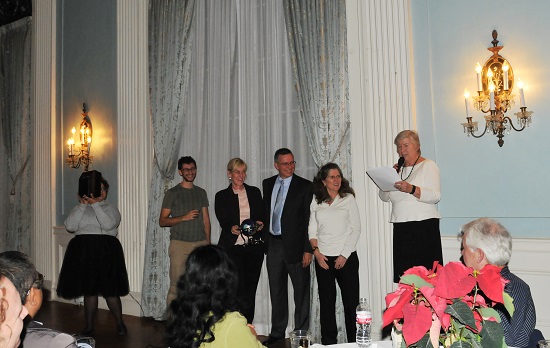
November 14-18, 2016: GHGT-13. GCCC will give a number of talks at this year's meeting, which is the largest and most prestigious meeting of experts working on greenhouse gas technologies. Luca Trevisan, Ana Gonzalez-Nicolas and their co-authors will present, "Experimental and modelling study of capillary/buoyancy driven flow of surrogate CO2 through intermediate-scale sand tanks." Prasanna Ganesan Krishnamurthy, Luca Trevisan and Tip Meckel and their co-authors will present, "Understanding the effects of small scale heterogeneity on buoyancy driven CO2 migration for capillary trapped storage capacity estimation." Katherine Romanak, Changbing Yang, and Roxana Darvari will present, "Towards a method for leakage quantification and remediation monitoring in the near-surface." Vanessa Nuñez-Lopez, Ramon Gil-Egui, and Seyyed Hosseini will present, "Carbon balance of CO2-EOR for NCNO classification." Susan Hovorka and her co-authors will present, "Optimisation study of microseismic monitoring system at the CO2 injection site – lessons learnt from monitoring experiment at the Cranfield Site, M.S., U.S.A." Changbing Yang and his co-authors will present the poster, "Injectivity of offshore CO2 sequestration in marine sediments." Luca Trevisan, Tip Meckel and their co-authors will present the poster, "Application of invasion percolation simulations to predict plume behavior through a heterogeneous intermediate-scale sand tank." Susan Hovorka will present the poster, "Monitoring after closure: a case of the horse already out of the barn." Seyyed Hosseini and Reza Ganjdanesh will present the poster, "Geologic carbon storage capacity estimation using enhanced analytical simulation tool (EASiTool)." Prasanna Ganesan Krishnamurthy, Luca Trevisan, and Tip Meckel will present the poster, "Investigating the influence of geological heterogeneity on capillary trapping of buoyant CO2 using transmitted-light flow visualization experiments." Susan Hovorka will present the poster, "Assessment of low probability material impacts." Changbing Yang and his co-authors will present the poster, "CO2 Sequestration and Enhanced Oil Recovery at Depleted Oil Reservoirs." Jean-Philippe Nicot, Alexander Sun, and Rebecca Shuang Gao will present the poster, "Identification of a minimum dataset for CO2-EOR and CO2 storage monitoring at Weyburn, Canada." Lausanne, Switzerland
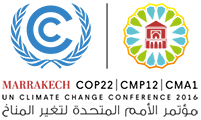
November 7-18, 2016: UNFCCC COP-22. GCCC will host the only official UNFCCC side event devoted entirely to CCS at the world's largest meeting on climate change mitigation. The side event is hosted in collaboration with IEAGHG, Carbon Capture and Storage Association (CCSA), and CO2GeoNet, and will focus on “Opportunities for Africa in Carbon Capture and Storage.” Katherine Romanak will attend, along with panelists from IEAGHG, CO2GeoNet, International CCS Knowledge Centre and colleagues from Africa including Felicia Chinwe Mogo, Joseph Essandoh-Yeddu and Tony Surridge. For more information and a link to live stream the event, please see our archived blog. Marrakech, Morocco

From L-R: Joseph Essandoh-Yeddu, Energy Commission, Ghana; Tony Surridge, South African National Energy Development Institute; Michael Monea, International CCS Knowledge Centre; Ton Wildenborg, CO2GeoNet; and Katherine Duncker Romanak, the University of Texas at Austin
November 8, 2016: UNFCCC Side Event: Opportunities for Africa in Carbon Capture and Storage (CCS) This side event was presented by the University of Texas at Austin, the Carbon Capture and Storage Association (CCSA) and the European Network of Excellence on Geological Storage of CO2 (CO2GeoNet) and moderated by Tim Dixon, International Energy Agency Greenhouse Gas Programme (IEAGHG).
The aim was to consider progress towards CCS deployment in Africa and global CCS onshore and offshore developments relevant for Africa. GCCC's Katherine Romanak addressed specific actions to get countries on the path of CCS. Noting that offshore CO2 storage potential is "huge" and stressing available technical assistance on climate technologies for developing countries, she highlighted the Carbon Sequestration Leadership Forum (CSLF), the Climate Technology Centre and Network (CTCN) and the Gulf Coast Carbon Center (GCCC).Other participants were Mike Monea, Joseph Esjandoh-Yeddu, Felicia Chinwe Mogo, Tony Surridge, Ton Wildenborg.
For complete coverage of the event, please click here.
October 25-28, 2016: 6th International Acid Gas Injection Symposium. Susan Hovorka presented a talk "Progress toward commercialization of carbon capture, use, and storage for greenhouse gas management." Houston, TX
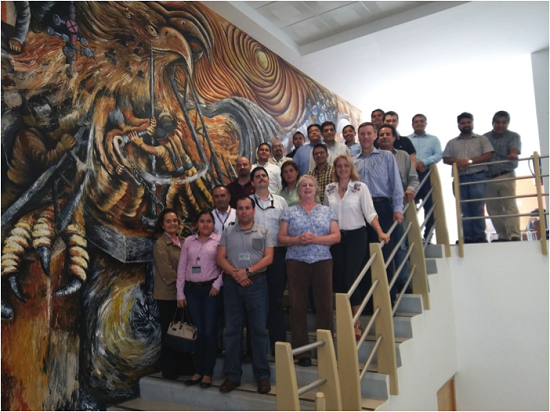
October 17-21, 2016: Monitoring, Measurement and Verification for CO2-EOR Projects. This workshop was hosted by PEMEX near Cinco Presidentes Asset where the Mexican oil company is planning to run the first CO2-EOR project in the country. It was part of a training program coordinated and led by the Ministry of Energy in Mexico (SENER) through the Direction of Clean Technologies aimed at providing specialized training to the engineers and technicians working on PEMEX EOR programs, as well as professionals from the Federal Commission of Electricity (CFE) and the National Autonomous University of Mexico (UNAM) who are also participating in CCS projects. The week-long course provided twenty four attendees with applied instruction on the design and implementation of CO2 monitoring strategies at CO2 EOR floods. Novel approaches for risk assessment were also covered. The workshop concluded with case-study exercises where groups were given hypothetical project descriptions along with a geologic framework and were asked to design a monitoring strategy able to detect any potential CO2-EOR leakage. Susan Hovorka and Vanessa Nuñez-Lopez were instructors for the workshop. Villahermosa, Tabasco, Mexico
September 16, 2016: 4th Annual Bureau Research Symposium. GCCC staff took home two best poster awards. Reza Ganjdanes and Seyyed Hosseini won for "EASiTool: An Enhanced Analytical Simulation Tool for Storage Capacity Estimation." Luca Trevisan, Tip Meckel, and Prasanna Krishnamurthy won for "Developing a Predictive Method for Local Capillary Trapping Capacity Estimation of CO2 Using Invasion Percolation Simulations in Realistic 3D Numerical Lithofacies Models." Congratulations!
September 9-12, 2016: 2016 US China Clean Coal Development Forum. Susan Hovorka gave a talk titled “The role of reservoir characterization in CCUS" at the Forum, which is an opportunity to make presentations on US experience on best practices with CCUS. She also attended a technical planning meeting with Yanchang Petroleum Company in Xian. Ordos, China
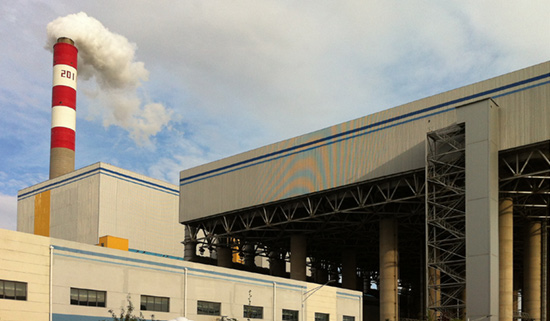
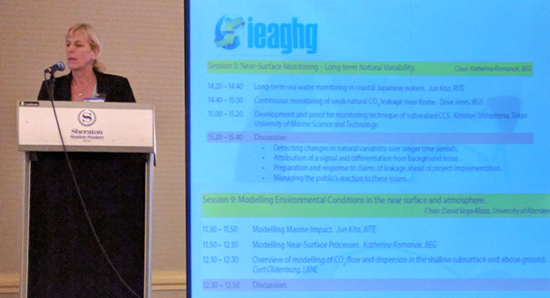
August 16-18, 2016: DOE NETL Annual Stakeholders Meeting. This year's conference was titled, Mastering the Subsurface through Technology Innovation and Collaboration: Carbon Storage and Oil and Natural Gas Technologies Review Meeting. A number of GCCC staff attended and gave updates on recent research. Alex Sun gave two talks, "Pressure-Based Inversion and Data Assimilation System (PIDAS) for CO2 Leakage Detection" and "Development of a Framework for Data Integration, Assimilation, and Learning for Geological Carbon Sequestration," as well as present during a monitoring session. Seyyed Hosseini presented, "Enhanced Analytical Simulation Tool for CO2 Storage Capacity Estimation and Uncertainty Quantification," and presented during a session on capacity and storage efficiency. Vanessa Nuñez-Lopez presented "Carbon Life Cycle Analysis of CO2-EOR for Net Carbon Negative Oil (NCNO) Classification." Tip Meckel gave the talk, "Offshore CO2 Storage Resource Assessment of the Northern Gulf of Mexico." Katherine Romanak presented a poster titled "Simple Method for Leakage Attribution and Quantification in the Near-Surface." During the meeting, IEAGHG organized a plenary panel on the recent IEAGHG International Monitoring Network meeting hosted by BGS and held in Edinburgh, UK. Members of its International Steering Committee attending the USDOE presented highlights. This included Katherine Romanak who presented a summary of shallow monitoring. Pittsburgh, PA
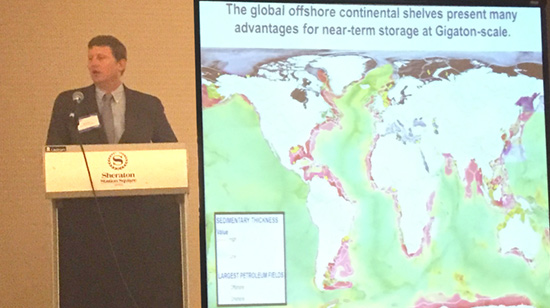
July 28, 2016: Congratulations to PI Tip Meckel and GCCC staff who have been awarded a new DOE grant under the Subsurface Technology and Engineering Research, Development, and Demonstration Crosscut Initiative. With the funding, high resolution seismic technology known as the P-cable will be used to evaluate storage units at Japan's fully developed CCS project at the Tomakomai Site. For more on the project, please see our archived blog.
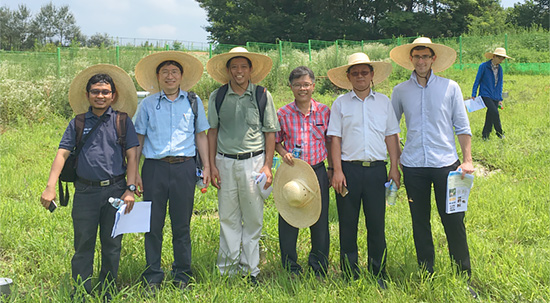
July 19-21, 2016: 7th International Environment Forum for CCS. Changbing Yang was invited by Prof. Seong-Taek Yun, the director of Korea CO2 Storage Environmental Management (K-COSEM) Research Center and Prof. Weon-Shik Han, Yonsei University to participate as an international expert in the meeting. The K-COSEM Research Center was founded in 2014 and is supported by Korea Ministry of Environment with about $38M for 7 years to develop multi-media environmental management technologies for soil/groundwater/atmosphere/ecosystem in preparation for using CCS technology. Yang gave the talk, "Assessing Potential Impacts of CO2 Leakage on Groundwater Quality and Monitoring Technologies with Field Controlled Release Tests." He participated in a trip organized by K-COSEM organized to visit the field controlled release facilities at Eumseong. Yang also presented a talk, "Integrated Framework for Assessing Impacts of CO2 Leakage on Groundwater Quality and Monitoring-Network Efficiency: Case Study at a CO2 Enhanced Oil Recovery Site" in a special workshop at K-COSEM Research Center at Korea University. During the visit, Yang discussed future collaborations with Profs Seong-Taek Yun and Weon-Shik Han, including the potential for efficiently using the field controlled release facilities at the GCCC research site, Brackenridge Field Laboratory, TX and the K-COSEM site at Eumseong, Korea.
July 17-23, 2016: 10th IEAGHG Summer School. Fifty students from over 17 countries attended the prestigious summer school held at the University of Regina and hosted by BHP Billiton SaskPower CCS Knowledge Centre. Katherine Romanak gave presentations on the environmental impacts of storage and on shallow monitoring and verification in the onshore and offshore environments. She also served as an expert mentor for the students. Regina, Saskatchewan, Canada
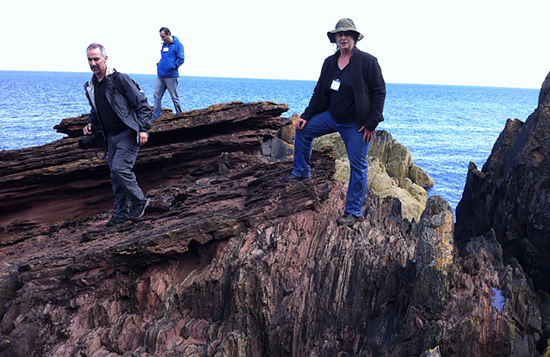
Susan Hovorka straddling the unconformity described by James Hutton in 1788 at Siccar Point near Edinburgh during a field trip hosted by BGS.
July 6-8, 2016: IEAGHG R&D Monitoring and Modeling Network. Susan Hovorka, Katherine Romanak, and Seyyed Hossieni attended the meeting hosted by the British Geological Survey at the University of Edinburgh Centre for Carbon Innovation. The theme of the meeting was using the modelling-monitoring loop to demonstrate storage performance more effectively. Hovorka presented a talk "Model based cost for monitoring" with co-authors Behni Bolhassani, Seyyed Hossieni, Jacob Anderson, and Changbing Yang. She also led a discussion of the EOR-MRV plan developed by Oxy and approved to meet EPA's subpart RR reporting requirements under the Clean Air Act. Seyyed Hosseini presented "Diffusivity tomography with harmonically modulated pressure signals to detect CO2 leakage in Above Zone Monitoring Interval." Katherine Romanak organized a discussion on the implications of long-term natural variability in near-surface monitoring and presented a talk on "Modeling Near-Surface Processes". Edinburgh, Scotland
June 15, 2016: Research Experience in Carbon Sequestration (RECS). RECS is an intensive 10-day, interactive program combines classroom instruction with group exercises, CCUS site visits and hands-on field activities that cover the range of science, technology, policy, and business topics associated with CCUS deployment. Vanessa Nuñez-Lopez taught several classes both this summer and last. Her classes included "Fundamentals of CCUS/CO2-EOR" and demonstration lab called "Group Exercises in Storage Concepts," in which students competed to create the tightest packing and lowest porosity using beads of different sizes. Birmingham, Alabama
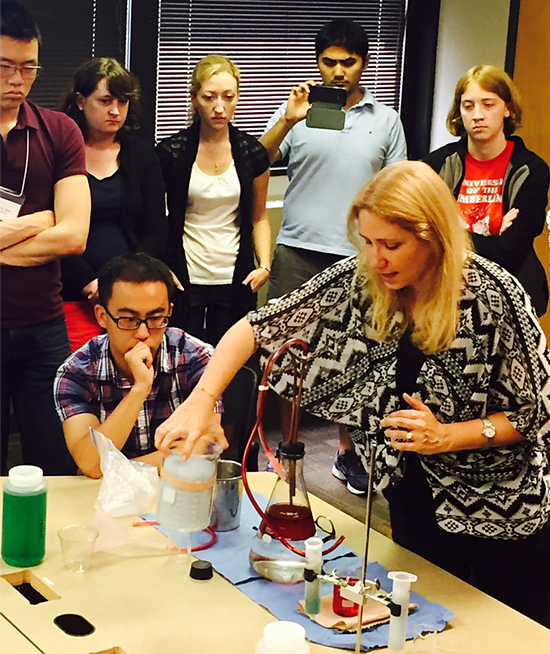
Click photo to view larger
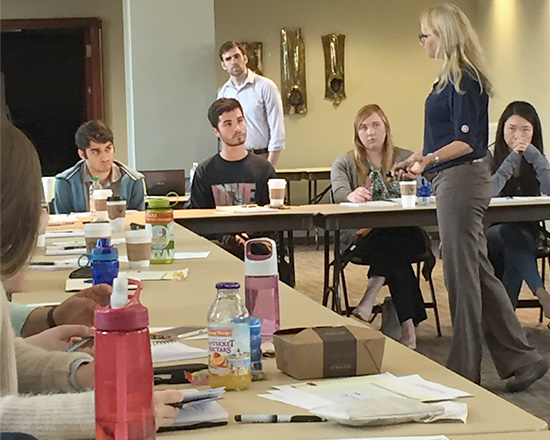
Click photo to view larger
June 14-16, 2016: CCUS Converence. Katherine Romanak presented a poster on "Towards a Simple Method for Leakage Quantification in the Near-Surface." Tysons, Virginia
June 6-7, 2016: 5th U.S.-China Symposium on CO2 Emission Control Science & Technology. Susan Hovorka presented the monitoring talk. This symposium was hosted by Hosted by U.S. Department of Energy, Chinese Ministry of Science & Technology and Ministry of Education of the People's Republic of China. Hangzhou, China

June 2-3, 2016: 3rd CCUS Workshop U.S.-China Climate Change Working Group. Susan Hovorka gave two presentations as part of the session on Large Scale Integrated CCUS Project; Demonstration, Technical Needs and Polices. The presentations were titled, "Subsea Geologic Storage in Sediments Forming Continental Shelves – Needs, Potential, and Technical Issues" and "MMV to Document Storage Effectiveness and Environmental Protection in EOR Setting." Xian, Shaanxi, China
May 12, 2016: California Air Resources Board Well Integrity Technical Discussion. Katherine Romanak gave a presentation on "Environmental Quality over CO2 injection sites." The Discussion was held in order to ensure that staff were using the best available information to understand stakeholder concerns about CCS and to allow interested parties to provide input that would inform development of the CCS quantification methodology.
May 9, 2014: US-Norway Bilateral. Susan Hovorka attended the meeting hosted by Gassnova and the Norwegian Ministry of Petroleum. The meeting provided an overview of accomplishments made through the joint efforts of the countries, including the CSLF sponsorship of the recent Global Offshore Storage Workshop. Future collaborations were also discussed. Bergen, Norway
May 3-4, 2016: GHGT Planning Meeting. Susan Hovorka is serving on the GHGT Technical Program Committee. GHGT-13 will be held in Lausanne, Switzerland in November and GCCC plans to give a number of presentations. Katherine Romanak will present, "Towards a method for leakage quantification and remediation monitoring in the near-surface." Susan Hovorka will present "Monitoring after closure: a case of the horse already out of the barn", "Assessment of low probability material impacts", and with co-author Benhi Bolhassani, "Model-based assessment of the site-specific cost of monitoring." Seyyed Hosseini will present, "Geologic Carbon Storage Capacity Estimation Using Enhanced Analytical Simulation Tool (EASiTool)." Tip Meckel will present, "Offshore CO2 Storage Resource Assessment of the Northern Gulf of Mexico (TX-LA)." Luca Trevisan will give the presentation, "Experimental and modeling study of capillary/buoyancy-driven flow of surrogate CO2 through intermediate-scale sand tanks" and "Application of invasion percolation simulations to predict plume behavior through a heterogeneous intermediate-scale sand tank." Lausanne, Switzerland
April 20, 2016: Congratulations to Akand Islam, Alex Sun and Changbing Yang for the publication of a new paper in Scientific Reports, "Reactive Transport Modeling of the Enhancement of Density-Driven CO2 Convective Mixing in Carbonate Aquifers and its Potential Implication on Geological Carbon Sequestration." The authors studied the convection and mixing of CO2 in a brine aquifer, where the spread of dissolved CO2 is enhanced because of geochemical reactions with the host formations (calcite and dolomite), in addition to the extensively studied, buoyancy-driven mixing. They investigated nonlinear convection under the assumptions of instantaneous chemical equilibrium, and that the dissipation of carbonate rocks solely depends on flow and transport and chemical speciation depends only on the equilibrium thermodynamics of the chemical system. The extent of convection is quantified in term of the CO2 saturation volume of the storage formation. The results suggest that the density increase of resident species causes significant enhancement in CO2 dissolution, although no significant porosity and permeability alterations are observed. Early saturation of the reservoir can have negative impact on CO2 sequestration.
April 19-20, 2016: International Workshop on Offshore Geologic CO2 Storage. GCCC was delighted to host, along with SANEDI, IEAGHG, and CSLF, a global needs assessment meeting to initiate a discussion about the various aspects of offshore transport and storage and to build an international community of parties interested in offshore storage. Representatives from over a dozen countries were present at the meeting. For more on the workshop, please see the GCCC blog. Austin, TX
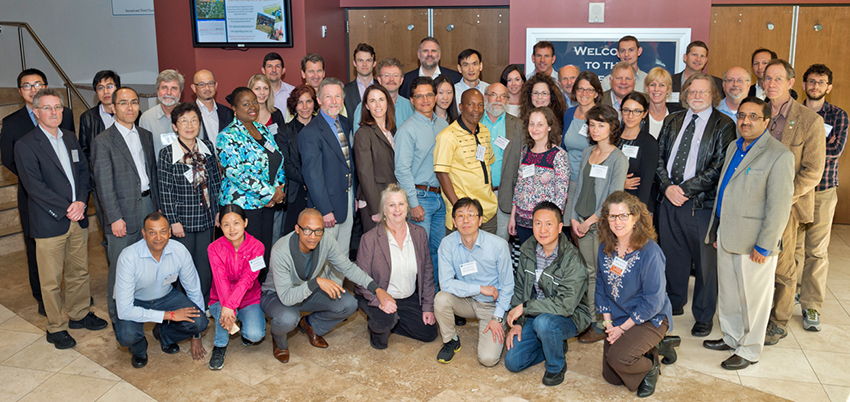
Click photo to view larger.
April 12-15, 2016: Susan Hovorka visited Mexico City and took part in a number of CCS-related workshops and meetings. She attended the CCS Working Group, North American Energy Minister's Trilateral and presented, "Case Study C: Early Test at Cranfield Oil Field in Mississippi by SECARB" in Mexico City. She also attended a workshop for PEMEX professional staff and took part in Villahermosa Academic Trilateral Efforts on CCUS.
April 15, 2016: GCCC research assessing offshore CCS in the Gulf of Mexico was featured on the Bureau of Economic Geology's website. The story describes work by Tip Meckel capturing high resolution 3D seismic off San Luis Pass.
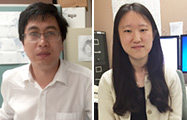
April 6, 2016: GCCC is delighted to welcome visiting researchers Pengchun Li and Xueyan Liu and from the South China Sea Institute of Oceanology, Chinese Academy of Sciences. The scientists will be visiting for six months, working with Jiemin Lu, Seyyed Hosseini and Vanessa Nuñez-Lopez and other staff to advance efforts to evaluate feasibility of CCS and EOR potential in Guangdong. GCCC's ongoing collaboration with Dr. Di Zhou through the U.S.-China Climate Change Working Group helped facilitate their visits.
April 1, 2016: BEG Seminar Series. Vanessa Nuñez-Lopez gave a talk, "Carbon Balance of CO2-EOR for Net Carbon Negative Oil Classification," which is available for online streaming viewing.
March 11, 2016: Craft and Hawkins Department of Petroleum Engineering at Louisiana State University. Susan Hovorka gave a talk on "Use of reservoir engineering skills in carbon capture and geologic storage projects." Baton Rouge, LA
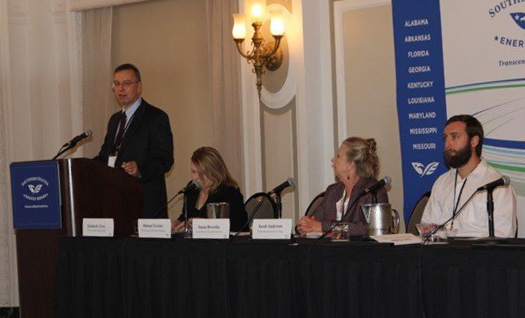
Ramón Treviño, Susan Hovorka, and Jacob Anderson participated in the annual SECARB meeting.
March 9-10, 2016: 11th Annual Southeast Regional Carbon Sequestration Partnership Stakeholders' Briefing Ramón Treviño presented a Retrospective on the SECARB Early Test and Offshore CO2 Storage Resource Assessment of the Northern Gulf of Mexico (Texas-Louisiana). Jacob Anderson gave a talk on CCS Fluid Source Attribution. Susan Hovorka gave a talk on Monitoring a CO2-EOR Project for Storage. Atlanta, GA
March 2-4, 2016: British Geological Survey and UK Foreign and Commonwealth Office of CO2 Storage Workshop. Susan Hovorka will attend the workshop which will focus on CCS pathways from pilot to demonstration. Nottingham, UK
February 25-26, 2016: International Academic CCS Summit. Susan Hovorka will attend the the summit at the University of Edinburgh to explore opportunities for collaboration. Edinburgh, Scotland
February 22-24, 2016: International Standards Organization. Susan Hovorka will meet with a working group of ISO, which is developing consensus on a method of accounting for CO2 injected for oil recovery as part of an CO2 EOR process. Amsterdam, The Netherlands
February 22, 2016: Congratulations to Tip Meckel and former GCCC student Francis Mulcahy for the publication of their paper, Use of novel high-resolution 3D marine seismic technology to evaluate Quaternary fluvial valley development and geologic controls on shallow gas distribution, inner shelf, Gulf of Mexico. The paper describes the first deployment of the P-Cable™, a high-resolution 3D (HR3D) seismic acquisition system in the Gulf of Mexico. The instrumentation provided unprecedented resolution of depositional, architectural, and structural features related to relative sea-level change recorded in the Quaternary stratigraphy, details that are typically beyond conventional 3D seismic resolution or shallower than most commercial targets. Read More: http://library.seg.org/doi/10.1190/INT-2015-0092.1
February 16, 2016: The Gulf Coast Carbon Center is thrilled to host an Offshore CCS Workshop in partnership with SANEDI (South African National Energy Development Initiative), IEAGHG, and the Carbon Sequestration Leadership Forum. The Workshop will be held April 19-21, 2016, and its goals include forming a global needs assessment for offshore CCS, initiating a discussion about the various aspects of offshore transport and storage, and building an international community of parties interested in offshore storage. The workshop will facilitate countries to identify their specific issues, challenges, opportunities, etc., identify synergies, common gaps and goals, and define common action items. We will be posting links to more information and registration as soon it becomes available.
February 8, 2016: Congratulations to Alex Sun, Jiemin Lu, Susan Hovorka, and Akand Islam, along with co-author Barry Friefeld for their publication "Using pulse testing for leakage detection in carbon storage reservoirs: A field demonstration" in the International Journal of Greenhouse Gas Control. The paper proposes time-lapse plus testing as a pressure-based monitoring technique for carbon storage reservoirs. The technique is successfully demonstrated and validated at a CO2-EOR site in a series of experiments. The results show that leakage events caused a significant deviation in amplitude of the frequency response function, indicating that pulse testing may be deployed as a cost-effective active monitoring technique, with potential for automated monitoring.
February 3-4, 2016: Global CCS Institute's Fifth Annual Americas CCS/CCUS Forum. Rebecca Smyth represented GCCC at the meeting whose aim was to bring together senior level government, industry, academic, and environmental NGO leaders to discuss opportunities and challenges associated with CCS/CCUS and the policies and actions needed to enable its broad deployment post Paris COP21. Washington, DC
January 25-26, 2016: First US-Japan CCS Collaboration Meeting. Tip Meckel attended the meeting which included discussion of current CCS research topics in Japan and the U.S. Members of US-DOE, RITE, and Japan METI were in attendance. Meckel also participated in a site tour of the Tomakomai CCS Demonstration Project on the southern coast of Hokkaido, which is nearing completion. Tokyo, Japan

Meckel toured the Tomokomai CCS site in northern Japan. Click photo to view larger.
January 13-15, 2016: International Offshore CO2 Storage Roundtable. The 2-day roundtable aimed to identify the next step for CO2 offshore storage research and demonstration in South China. More than 40 distinguished Chinese and International CCUS experts attended including GCCC's Tip Meckel who presented a talk on five offshore research projects in North America. The meeting also included a visit to the Dongguan Low-carbon Industry Park. Beijing and Guangzhou, China
January 8, 2016: Congratulations to Akand Islam, Tip Meckel, and Alex Sun, along with co-author P.G. Krishnamurthy, who have just published the paper, "Numerical experiments of density driven CO2 saturated brine migration in heterogeneous two-dimensional geologic fabric materials" in the journal International Communications in Heat and Mass Transfer. Results indicate that course sands are better candidates for CO2 dissolution and than silts and that gravity drives more vertical saturation than horizontal. The range in grain size is the primary driver of convective and dissolution processes, and the correlation length of the sedimentary fabric has a minor impact.

